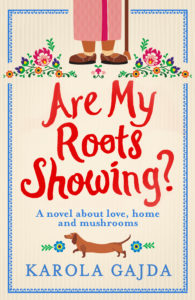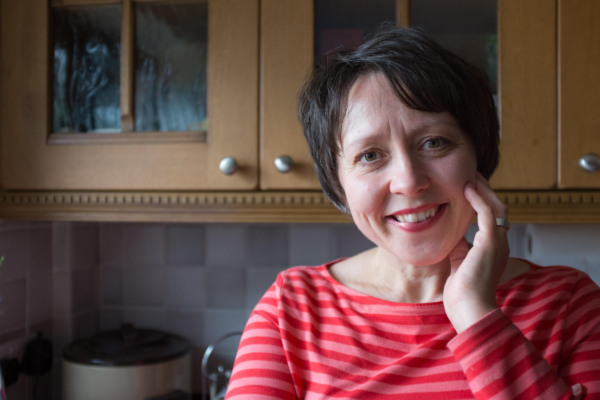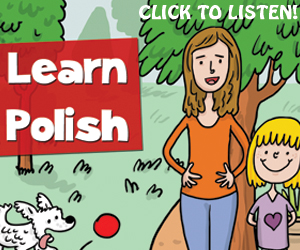“Some years ago I wrote and performed a solo show called My Polish Roots and Other Vegetables at the Edinburgh Fringe Festival. I spoke about my Polish Yorkshire upbringing and cooked barszcz on stage. Yes, my hands were dyed crimson pink by the end of the month!” says Karola Gajda, comedian, writer and author of Are My Roots Showing? in an interview with Brin Best.
Tell us about your Polish heritage and how this has affected, and continues to affect, your life.
“I was born in South Yorkshire to Polish parents who came to England after World War II. My parents didn’t come over as a couple, they met in Yorkshire. Too young to fight, Dad worked on a German farm during the war while Mum was taken by Stalin to Siberia for six years, when she was three.
When Mum was about 20 and working in Poland as a primary school teacher, the Red Cross International Tracing Service contacted her to say that her father – separated from them when they were deported – hadn’t died but was alive and in Yorkshire. He had marched with Anders Army and fought at Monte Cassino. She went to visit him, only intending to stay for a while, however she then fell gravely ill and met my father while in hospital.
Little wonder then that for me, my sense of Polish heritage will always be linked to World War II. I’m very aware that I’m only Polish and British because of how war blew people’s lives apart – and also because of Poland’s relationship with Great Britain.
On a lighter note, I also think being dual nationality simply makes life more interesting. You’re connected to more than one culture and more than one history, you probably have a second language at your fingertips too, and knowledge of a second cuisine!”
Your higher education included a period living in France, studying performing arts. How would you describe this experience?
“The chance to study, work and live abroad is always a wonderful opportunity and I remember my time in France as if it were yesterday. I studied at Jacques Lecoq’s School of Theatre, Mime and Movement in Paris for two years and it was wonderful to meet people who shared the same interest in theatre as myself. The school had an emphasis on improvisation and ensemble work, and it was a very creative time.
 Interestingly, while in Paris, I ended up translating Krzysztof Kieslowski’s Three Colours Blue, White and Red from Polish to English and was an extra in one of the films in the trilogy! The day I was on set, I remember watching Kieslowski pondering over whether the sunlight was quite right, and standing next to Juliette Binoche outside Le Palais de Justice for quite some time!”
Interestingly, while in Paris, I ended up translating Krzysztof Kieslowski’s Three Colours Blue, White and Red from Polish to English and was an extra in one of the films in the trilogy! The day I was on set, I remember watching Kieslowski pondering over whether the sunlight was quite right, and standing next to Juliette Binoche outside Le Palais de Justice for quite some time!”
You have carried out a wide range of roles over the years. What did these teach you?
“I’ve done all kinds of things in my life: I’ve been a radio journalist, worked in theatre, schools and universities, and I’ve even been a volunteer hospital chaplain. What I think I’ve learned is that if you do your best, people really notice and respect that – after all, there’s not much more you can do than your best. I think my personal strength is being able to talk and connect with most people – and I know that everyone, no matter what their background, has a story to tell.”
For several years you ran a comedy club in London. What were the highlights of this period?
“The highlights were hearing audiences bursting into laughter. With comedy, I know it’s obvious, but it’s all about the laughs. I rang the historic comedy venue Bunjies, near Leicester Square, at one point (Bob Dylan once played there, many moons ago) and it was always satisfying when a night went well.”
You performed a play you wrote at the Edinburgh Fringe Festival some years ago. What was this experience like?
“I wrote and performed a solo show called My Polish Roots and Other Vegetables which was on at the Gilded Balloon. I cooked barszcz (beetroot soup) on stage (yes, my hands were dyed crimson pink by the end of the month!) and I also spoke about my Polish Yorkshire upbringing. It was exciting, nerve-wracking and special as I met so many wonderful people including the Poles of Edinburgh. Doing the Edinburgh Fringe takes quite a bit of endurance and you have to be well prepared, organised and believe in your work – it’s a bit like doing a marathon really. There is so much on, you have to work hard to stand out and you never quite know when someone from the press is in the audience – unless you ask the box office beforehand, of course.”
Your novel Are My Roots Showing? was published in 2016. What were you trying to achieve with this book?
“Because of my passion for comedy, I wanted to create laughter. However, I also wanted to write something that would be a permanent record of my parents’ experiences from the war, so alongside the comedy there’s also tragedy. Not many people know about Siberia and while they might not pick up a book about Polish history, they might well pick up a popular novel where a darker story lurks. I also wanted to write a novel that incorporated how Poland has changed over the years, and convey the less-covered perspective of a Brit emigrating to live and work in Poland, not vice versa.”
Your second novel will soon be published. Tell us more about that book and its themes.
“I’m a Christian and I thought it would be good to write a book that involved God as a character. It’s another comedy, and is essentially the diary of an ordinary wife who does her best to ‘honour and obey’ her husband – but usually fails – in a funny way of course. It’s called The Diary of An Obedient Wife and will be out this autumn. I hope a lot of women, Christian or not, will identify with it and find it funny.”
What new creative projects are you planning at the moment?
“I’m very busy dotting the i’s and crossing the t’s on The Diary of An Obedient Wife. Then, I think I might have a short rest before the next idea takes hold!”
FURTHER INFORMATION
Karola asked if she could have the following link added to the interview where there is space somewhere: http://karolagajda.com
***
 This interview was carried out as part of the ‘Poles in the UK’ project, and is linked to the book Poles in the UK: A Story of Friendship and Cooperation (by Brin Best & Maria Helena Żukowska, 2016).
This interview was carried out as part of the ‘Poles in the UK’ project, and is linked to the book Poles in the UK: A Story of Friendship and Cooperation (by Brin Best & Maria Helena Żukowska, 2016).
For more details, and to download
a free eBook PDF version of the book, visit: www.polesintheuk.net.











![Czy to możliwe? Laxton Hall po raz szesnasty! [ZDJĘCIA]](https://www.tydzien.co.uk/wp-content/themes/LondonLive/thumb.php?src=/media/2024/06/Głowne-zdjęcie-do-artykułu-nr-3-600x400.jpg&w=95&h=74&zc=1&q=100)




everything
Aԝesome article.